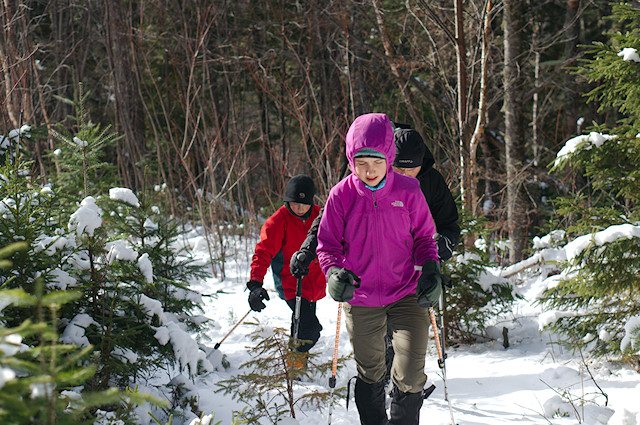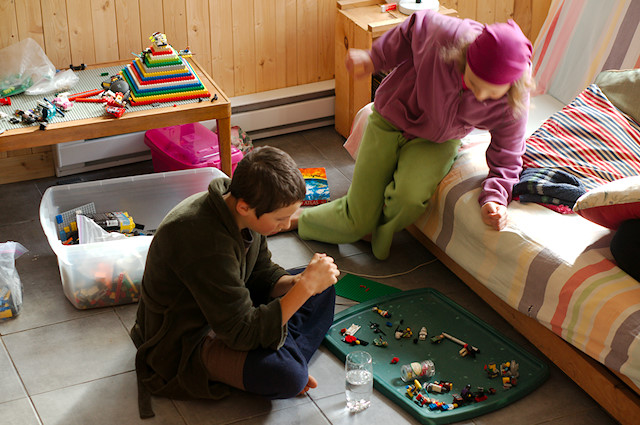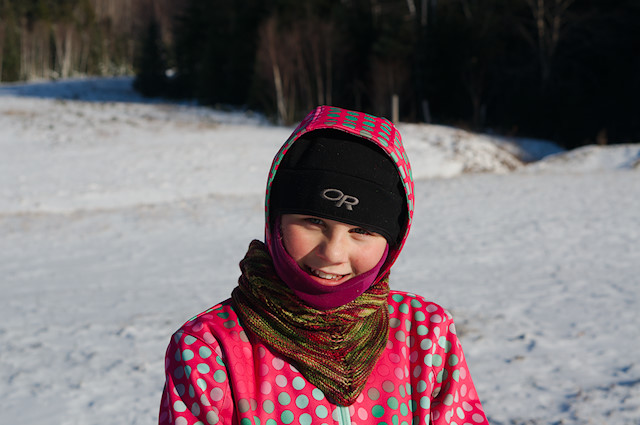Get posts by email
Training in the Early Years ~ A Foundation for Self-Discipline
December 4, 2013

I got a blog comment earlier this fall about discipline. It was a question about discipline in the child training context, ie: teaching your children to listen, obey, that kind of thing.
I took some time thinking about how to respond to that question, composed a post-length reply and then couldn't find the comment!
I had hoped to bury that reply in comments as opposed to having to share it quite publicly in a post because as soon as you start to talk about child discipline you potentially open yourself up to all sorts of criticism.
I'm not going there. I'm not criticizing other parents, nor am I inviting it here in this space. But neither will I shy away from using words like obey and respect, along with love and trust. It's all part of the package.
Since I was going to write a post about the D word I figured I might as well wade right in and share something else that's been on my heart for a while - teaching self-discipline in the interest-led, love of learning, and freedom based homeschool environment.
There are a couple myths about discipline in this type of homeschooling environment.
Myth One: If you are self-directed learners, and let your children largely pursue their own interests as their education, you must not have a very disciplined home and family life. It must be chaos after all to let your kids "do their own thing".
Myth Two: If you are self-directed learners, and let your children largely pursue their own interests as their education, your children won't learn self-discipline. They don't learn to apply themselves to less-than-pleasant tasks. In short, they are not equipped for real life drudgery.
I will address Myth One - self-directed learners must not have very much parental control or oversight, and family life must be chaotic and "undisciplined", with my answer to the original comment that sparked this post in the first place.
My thoughts on early years child discipline and training, as based on our experience.
I believe in tight reins and tight boundaries when children are little, in an atmosphere of unconditional love and acceptance. We are authoritative parents. We're the authority in the home and our focus when our children were little was trust, obedience, love and respect.
The serious training ground for this philosophy, especially with regards to obedience, is ages 18 mos to about 3 or 4 years.
We are also very responsive to our children during these ages and many would consider our practices to be inline with attachment parenting philosophies - extended nursing, nighttime responsiveness, very few babysitters and almost no de-tachment from us.
In these early years we laid the foundation of both our children's importance in our home and their place in it - as our children, not our equals.
There was a definite emphasis placed on obedience during these years, which probably doesn't line up with the attachment parenting philosophy. I don't really know. I haven't read any attachment parenting books.

As our kids get older, knowing that they trust and respect us and feel absolute unconditional love from us, we let out the reins, step by step. From the time our kids reached about age 5 or 6 we've done very little of what other people would call "disciplining". There haven't been "consequences", punishments, time-outs, or other stuff like that. Maybe a few but none I can really recall.
There have been certain intense stages that need more of our attention, especially with our youngest but we haven't had difficult behavior or discipline issues in our home, past the toddler stage and pre-school stages which were very focused on establishing the behavior and attitudes we wanted in our home - respect, compliance (yes, compliance), and happy obedience (yes, obedience and happy to do so).
But we're not done parenting. The teenage years await and I'm sure we'll go through discipline trials and tribulations again.
Having said that, our now 14 year old has an incredible amount of autonomy in our home - over her schooling, her relationships, her interests, music choices, video games etc... She has that automony within the safety net of a loving relationship. We trust her and she respects us.
Some people approach parenting the opposite way - loose boundaries for behavior when the kids are little and then they try to crack down later reining in the behaviors they don't want in their home.
It's not just about behavior of course, it's about our children's hearts. Capturing their hearts has always been our goal. We want them to know how very much they are loved by God and us. And what love in action looks like and how love guides our behaviors. But when you're two, it's not the love in your heart guiding your behavior, it's your parents.

I'm not saying our kids are perfect or that we're perfect. We're not at all. We have to work on our relationships every day. And we're not done the game yet.
In summary, I'm a big believer in boundaries and unconditional love, and then total freedom in the loving relationship of those boundaries. In fact, those are probably two touchstones of my parenting philosophy.
When our children were little we established firm boundaries, in the context of unconditional love, and now we all experience a great deal of freedom within those boundaries. And as our children get older, while still living in our home, they get to set their own boundaries.
Our home is not a place of chaotic un-discipline. Our children have a lot of freedom, but we as parents set the boundaries for that freedom.
I think this way of parenting sets the a solid foundation for freedom based homeschooling, at least it did for us.
A couple additional thoughts
After writing out this response on early childhood training and discipline and sitting with these ideas for well over a month, a couple more ideas presented themselves to me.
Firstly, it occurs to me that this particular approach fits very well with my personality type. And maybe that's why it's worked well for us?
I'm a clear expectations and defined boundaries person and so I've parented this way. As my kids get older everything is much more open ended because I am no longer in charge of it all and this letting go has been a great growth experience for me (and our kids).
If you are curious about the interplay between parenting and personality type you might like the book MotherStyles. I haven't read the book but it looks like the perfect compliment to Nurture by Nature, which I highly recommend.
I also think my parenting style is heavily influenced by culture. I've been reading about Inuit culture and we have Inuit friends. Their culture has a completely different emphasis on childhood training, much more freedom for little ones in behavior, etc.
But where I see the boundaries in that society (I can't help it, I'm always looking for the boundaries), is in nature itself; the "ultimate" boundary.

Many "modern" cultures (for lack of a better description) don't contend with nature the same way and if we did our parenting boundaries would be different, I know mine would. And yes, I find the explorations of these ideas fascinating.
Now back to the Myths
My next post will delve into Myth Two, answering the question - is it possible for self-directed learners to apply themselves to drudgery?
Filed Under
Resource Library
-

Constance on Dec. 4, 2013, 3:34 p.m.
"Parenting With Love and Logic" is the only parenting book I've read. They also promote tighter control when children are small and loosening up as they get older so that teenagers can make their big mistakes when we can still guide them instead of when they're adults and the consequences could be much more severe. Thank you for sharing your thoughts with us!
-

Leslie on Dec. 4, 2013, 6:52 p.m.
I asked about discipline in a comment and have been hoping you would reply! Thanks for your insights. We also set rigid (well, more than many of our friends with kids) boundaries for our kids, and I think that they have benefited a lot, particularly when I observe other kids alongside my own.
I also have to admit I am relieved to hear that your family sets boundaries yet emaphsizes unconditional love and the role of the parents as the leaders and rule-setters. An acquantiance of mine sets no boundaries for her children and says she does it because of her unconditional love, and I have always felt a little guilty after reading her blog posts, wondering if I am just a mean parent.
I also asked about the dentist/diet combination :)
-

Leslie on Dec. 4, 2013, 7:07 p.m.
Ok, I had missed your comments about the dentist but just found them and will read them!
-

renee on Dec. 5, 2013, 3:33 p.m.
Leslie, I have more stuff coming in the next year or so about dentists since we just discovered the kids have a few cavities. I've been researching my brains out on this one, how to approach this from a plant-foods bias, which is completely different than most of the stuff out there that focus' on Weston Price's animal food bias.
-
-

renee on Dec. 5, 2013, 2:45 p.m.
Thank you Leslie for identifying yourself. You know I thought it was you but I searched and searched through my archives to find your original comment, with no luck!
I find the boundaries/unconditional love thing a point of contention (or disagreement) among parenting styles. And so I finally, when my kids were very young actually, said "forget what it's called, this is what we do", and it's worked for us.
It's also the way we view marriage, homeschooling and life really. Boundaries go hand in hand with unconditional love, the same way that freedom must always be juxtaposed responsibility.
A marriage example: Damien and I have pledged vows of fidelity to each other. There are boundaries in our hearts and minds about what we expose ourselves to that would cause our hearts to stray elsewhere. This is not just sexual either, so many women wish their husband was like this or that, they "lust" for a different type of man, someone more spiritual, or more sensitive or whatever. Damien is my life mate, till death do us part and then in those boundaries we love to explore our freedom (sexually and otherwise). Our freedom to do our thing as a couple, be exactly who we are without the need to compare ourselves to how other couples make it work.
And so it is in raising kids also. We set up boundaries in our home of accepted behavior (because how we behave communicates what's in our hearts and we start the chain of change in our hearts through our actions, it's both ways) and expectations of how we interact with each other - with kindness and respect. Then within those boundaries, where we all feel safe - we don't fly off the handle with our kids, we don't yell, etc.. there is so much freedom to explore our creativity, our personalities, our interactions with each other, how we can best suppport each other, etc.
And so it with homeschooling. We set up a structured home environment with regular chores and contribution to family life. Regular meals and coming together points during the day but between those boundaries there is a lot of freedom to explore our interests, for all of us.
You are not a mean parent for setting boundaries and expectations for behavior! Loving parenting can be both firm on the outside (leading, rule-setting) and soft and squishy inside.
-
-

Jaclyn B on Dec. 4, 2013, 7:17 p.m.
Would you mind giving more specific examples on setting boundaries and teaching happy obedience to littles (18 mo - 5yr)? We have a challenging 4.5 year old that likes to test boundaries and just is not grasping the concept that some issues are not up for discussion as they are for safety reasons. I'm looking for perhaps different ways of approaching this. I have not looked into personality styles much - perhaps that is where some of the difference lies. Any specific examples would be much appreciated!
-

renee on Dec. 5, 2013, 3:26 p.m.
Jacyln, I'm not comfortable with specifics because I am so far removed from that age and each child is so different but here's the principles you want to use: For things that are not up for discussion the child needs to learn obedience by having immediate consequences for disobedience.
The consequences will be different depending on the child and what is the most effective form of communicating "this is not up for discussion" for that child. It's simple behavior training. You do this, and this will happen.
As for happy obedience you teach that through repetition and your own emotional disposition in the training. My sister-in-law is amazing at this, watching her, I wished I had her as an example. As it was she was behind me in child raising and I've still learned a lot from there.
We taught our children to respond to us positively, to our request for obedience, with verbal affirmations - yes mommy, yes daddy. Our verbal expressions can lead us into heart transformations - I really believe this. Mantras, manifesting and other spoken words of affirmation do work. They can change the heart and the mindset of the speaker. And so we taught, and still teach our children, the power of our words and this applies to training the hearts of little ones also. Their little hearts may rebel at speaking and acknowledging your requests but I believe a transformation will occur.
This is just the same as requiring our children speak words of forgiveness when their siblings seek forgiveness (same goes for parents) - which we also required and taught, "now say, please forgive me" (not just I'm sorry), "now say, "I forgive you". These aren't holocaust crimes committed against each other. These are petty things and we teach our children to forgive without rancor and long drawn-out sullenness. Forgiveness binds us back together after a little rift and is so important for building loving relationships.
Perhaps that is also one reason our children get along so well. We haven't let them harbor negativity in their hearts towards each other. We call these things out in the light.
People seem so hesitant to do this, train children to speak affirmations and to respond affirmatively to parents probably because they worry they are "stifling" their children's true feelings.
I believe some true feelings must be rooted out of our children's hearts (weeding a garden), and our own, by learning to speak truth and kindness to each other, not by allowing those toxins to fester and nurturing them with silence.
Anyway, I hope that helps some. I found understanding my childrens' love languages and personality types to help with parenting immensely. I have a booklist on this page that might help you.
I want to encourage you that you are the expert on your child and you can have confidence in making the best discipline decisions for your family. So many "experts" and blog writers (not always the same thing) will teach/show/do something different than what we feel is right for our families. Once you have gathered a few ideas and resources, use your own love & logic to teach and train your children. And be empowered to do so - you are the Mom!
-

Jaclyn B on Dec. 9, 2013, 2:22 p.m.
Renee - Thank you so much for taking the time to respond. Its great to have such a positive approach to this subject. We'll keep working at it, I draw inspiration from your experiences! Thank you.
-
-

Ashley Floyd on Dec. 11, 2013, 11:54 p.m.
Rene, as always, I so value your insight and how clearly you are able to explain thoughts and ideas. RIght now, I have a 7 year old (almost 8), 5.5 year old, a 2 (almost 3 year old) and a 10 week old baby. We homeschool, as you know, and because my kids are together all the time, most of their squabbles are silly little things. But they still feel them very deeply. I, too, encourage them to seek forgiveness from each other and to give forgiveness when necessary, and there are moments when you think there's no way that will change the tension between the kids. Especially since it kind of is a forced thing. But somehow, just speaking those words, whether they originally meant them or not, changes the whole game. And hearing my two year old ask forgiveness or say, "I forgive you, August" just melts my heart. I always make mine hug each other afterwards, too and those are truly some of the most precious hugs to witness.
I definitely believe in the value of cognitive dissonance - where feelings follow actions. It is possible to override your emotions by just doing or saying the thing that needs to be said or done, and find that your emotions have been changed in the process.
One other interesting thing I've considered lately is that, as a Christ follower, I have a standard of behavior that I expect my children to follow. Basic things that are not only the right things to do, but they're things that God asks us to do in obedience to him as his children. I eventually want my children to desire to please Him and for these behavior issues to be resolved in the heart, not just because they know I expect it of them. But right now, they're still so young that while they "know" the right thing to do, they don't yet have a personal relationship with Christ and so aren't feeling any conviction from the Holy Spirit when they make bad decisions. It seems to me that this is an important time of training in that right way, and meanwhile, praying that each child will one day come to that personal relationship with the Lord where their behavior will be driven less by house rules and what mom and dad say and more by the nudging of the Holy Spirit.
-

renee on Dec. 12, 2013, 12:40 a.m.
Exactly. House rules proceeding Holy spirit-led living. (smile).
-
-
-

Johanna Hanson on Dec. 4, 2013, 8:08 p.m.
This was so good. I really appreciated your approach on setting boundaries within the realm of unconditional love and attachment parenting. I often see either extreme. My upbringing/background is more of the very strict authoritarian. I see the aspect of boundaries of that important, but I don't hold to all the strictness, and the (appearance, anyway) of lack of unconditional love.
I parent more attachment (breastfeeding/nighttime/etc). I have had trouble blending the two, so I find this particularly helpful. Thank you :)
-

renee on Dec. 5, 2013, 3:31 p.m.
Johanna, it's an interesting mix isn't it? Attachment and authoritative parenting (which is a bit different than authoritarian). I am a firm parent and I was when my kids were little but I was also "there" and emotional available (though I am not a super touchy feely person, so I had to grow into this) and very physically attached. Based on my experience, I think the combination works.
-

Johanna Hanson on Dec. 5, 2013, 4:37 p.m.
Good point about distinguising authoritative and authoritarian!
-
-
-

Sarah Mast on Dec. 4, 2013, 8:29 p.m.
I heard some advice a few years ago that I really loved and remember often: "People try to reason with their toddlers, and control their teenagers. It should be the other way around."
That made so much sense to me, and already with my oldest (only 6 1/2) we are letting go of certain things (he's asked) and he's done really well. He's already shown us we can loosen the boundaries a bit.
It's neat to see those things happen as they should, but a little scary at first!
Sarah M
-

renee on Dec. 4, 2013, 9:02 p.m.
"People try to reason with their toddlers, and control their teenagers. It should be the other way around."
Exactly! I couldn't have said it better.
-
-

Dorla on Dec. 8, 2013, 12:49 p.m.
Renee!
This is such a good post! It makes me want to start parenting the early years all over again!! The beauty of your advice is that I can glean the principles and visualize the goals and absorb this way of thinking even now that Samuel is 11.
In my mind you are still my coach!!!
Thanks.
P.S. Was at Smoky Mountains 2 weeks ago. Took about 100 steps on the AT in your honor!
-

renee on Dec. 9, 2013, 10:24 p.m.
Dorla, so nice to hear from you. Wishing you well this Christmas season. xo, Renee
-
You can subscribe to comments on this article using this form.
If you have already commented on this article, you do not need to do this, as you were automatically subscribed.






Jess on Dec. 4, 2013, 3:18 p.m.
Being an INFP, I find boundaries difficult to establish. However, we are at a point with one child (an INTJ) that some are necessary. I'm finding it hard to implement them with him; my older daughter would respond immediately if she knew that her actions/words were affecting others; he doesn't seem to care. It may be that I am so feeli and that causes me to see his behavior as insensitive and hurtful- effecting the way I discipline him. I am frustrated, to say the least. I look forward to more posts on the subject as I often find your insight and advice useful.
Elma on Dec. 8, 2013, 2:53 a.m.
How often ought to I water a giant plumeria in my yard?